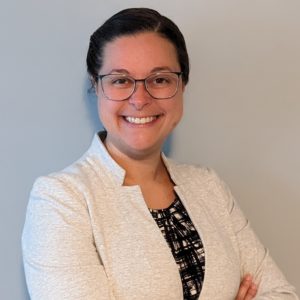| Catherine Fromen is an Assistant Professor in the Department of Chemical and Biomolecular Engineering at the University of Delaware. She received her PhD in Chemical Engineering from North Carolina State University in 2014 and performed postdoctoral studies at the University of Michigan as a University of Michigan’s President’s Postdoctoral Fellow. She joined the University of Delaware in 2017, where her research group focuses on applying chemical engineering principles to challenges surrounding pulmonary drug delivery. Her research and publications have spanned the design of inhalable immune-modulatory formulations and the development of experimental dynamic, full volume approximations of the airways. Prof. Fromen has authored over 40 manuscripts and patents and her team’s work has been recognized with recent awards, including receiving the AIChE’s 35 Under 35 Award, Univ Delaware Excellence in Mentoring Award, AIChE Delaware Valley Section Outstanding Faculty Award, PhRMA Foundation Research Starter Grant, and an NIH ESI MIRA Award. She is an active member of numerous professional societies, including ISAM (International Society of Aerosols in Medicine), ATS (American Thoracic Society), AAPS INC (American Association of Pharmaceutical Scientists Inhalation and Nasal Community), AIChE (American Institute for Chemical Engineers), and SFB (Society of Biomaterials), among others. |
Read Catherine’s Emerging Investigator article, ‘Destructive fibrotic teamwork: how both microenvironment stiffness and profibrotic interleukin 13 impair alveolar macrophage phenotype and function’
Check out Catherine’s lab group webpage to find out more about the group’s research https://sites.udel.edu/cfromen/
You can follow Catherine on Twitter @cfromen and @FromenLab or on LinkedIn https://www.linkedin.com/in/cathy-fromen/
Read our interview below:
1. How do you feel about Biomaterials Science as a place to publish research on this topic?
I was incredibly excited to receive an invitation to be featured in the Emerging Investigator Series of Biomaterials Science because this journal is one of the top places I look for exciting research within biomaterials and models of the lung, more specifically. Our manuscript introduces a biomaterials-based model of the human airway to evaluate changes to innate immune cells within a fibrotic-like microenvironment. Fibrosis remains such a complex and challenging set of diseases to treat and biomaterial-based models have a tremendous opportunity to unravel this complexity and provide opportunities to screen new therapeutic approaches. Biomaterials Science has been a leader in publishing many influential papers discussing biomaterials approaches to modelling, understanding, and treating fibrosis and I am very proud to contribute our piece in advancing this important field.
2. What aspect of your work are you most excited about at the moment and what do you find most challenging about your research?
I am certainly excited by the advances that biomaterials have enabled in engineering complex microenvironments that can mimic pulmonary tissue: in structure, composition, and barrier properties. I am even more excited about how these emerging models can be used to predict therapeutic responses in the lung. For inhaled medicines especially, it remains exceedingly difficult to directly sample responses in the airway to understand how inhaled formulations act in the lung; new, complex models will be critical in improving predictive capabilities and advancing inhaled therapeutics, such as inhaled vaccines or immunotherapies. It’s challenging to think about how far we have to go, but motivating at the same time.
3. In your opinion, what are the most important questions to be asked/answered in this field of research?
This a tough question; how to pick just one! For inhaled drug delivery, the big questions are “how can we predict where an inhaled agent goes?” and once there, “how does it work?”, especially in directing local immune responses. Answering these questions will allow us to develop more complex inhalable immunotherapies and better treat patients with respiratory conditions.
4. Can you share one piece of career-related advice or wisdom with other early career scientists?
Find your “people” – in life, in your institution, in your professional societies, in your students – and work to maintain those connections. They’re the ones who will pick you up when you fall, cheer for you when you need it most, and open doors you didn’t even know existed.











